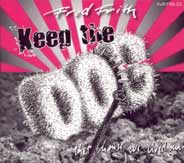Fred
Frith
Keep
The Dog
(Fred
Records/ReR)
Guitar
player, multi-instrumentalist, composer Fred Frith surely needs no introduction.
Starting with the first Henry Cow album, thirty years ago, he has travelled
genres and - later - Continents. Just to mention a few experiences, we can
recall Art Bears, Skeleton Crew, Massacre, his collaborations with Material
and John Zorn, his duo projects with Chris Cutler and Henry Kaiser, his numerous
solo records, his Guitar Quartet, his improvising work in very different contexts,
his teaching activity and so on. An easy-to-envy position, where his catalogue
is engaged in a friendly competition with his many new releases on a number
of labels. But this can make life difficult for somebody who wants to know
more but finds him/herself paralyzed by too much product.
A
problem that in a way is only made worse by his new personal label, Fred Records,
which is releasing some new titles and quite a few of his past albums that
in many ways we could consider to be his "classic" releases. But
some of those releases could help newcomers solve their dilemma: they could
start with Guitar Solos ('74), a work whose exploratory nature remains largely
intact; add the easy to enjoy Gravity ('80), in my opinion quite superior
(cause of Zamla?) to the later (and also re-released) Speechless; and the
almost-anthology of Step Across The Border ('91), to which I'd add the soon-to-be
re-released Cheap At Half The Price ('83), with its nice songs. And if a double
CD doesn't look like too much of a good thing, we could also add Keep The
Dog: an album which presents live and unreleased versions of some of his compositions
as played by a beautiful line-up, and which many long-time Frith admirers
had waited for for quite some time.
Keep
The Dog was the name of the group that Frith assembled at the end of the eighties
in order to play live a part of his vast repertoire - improvisation included,
of course. Since the versions that appear on this CD are from 1991 (the recordings
were made in Austria, Germany and Italy) it's only natural that the sextet
plays the material with a freshness, assurance and creativity which tell of
a long work together. (Here we have to shed a tear to the disappearance of
a circuit - and of an audience? These are not performances one gets after
a week of rehearsals leading to a "prestigious premiere"...)
We
have two excellent Canadian players: Jean Derome and René Lussier,
the former on saxophones and flute, the latter on guitar and - sometimes -
on bass, an instruments which is mostly played by Frith himself - he also
plays violin, guitar and also sings. Very good keyboards, accordion, electric
harp and - when the venue offered one - piano by Zeena Parkins. A limpid rhythm
framework is offered by Charles Hayward, while Bob Ostertag's sampler is often
indispensable but not always easy to hear.
The
repertory comes from everywhere: there is Bones by Massacre; Foot In Hole
off The Country Of Blinds, Skeleton Crew's second album, in a quite longer
version; three tracks - Walking Song, Some Clouds Do and Instant Party - come
from the aforementioned Cheap At Half The Price; The Trace is from Who Needs
Enemies?, the second duo album recorded with Henry Kaiser; the famous Norrgården
Nyvla and Year Of The Monkey are obviously from Gravity. I also liked Suspended,
for piano, flute and sampler. Time has been kind to these melodies and arrangements,
which now sound "classic". Taking for granted the fact that Lussier
is an excellent guitarist, I would have liked to hear a bit more Frith on
guitar, since in my opinion his style and timbre add a lot of personality
to the whole (isn't it also true of his violin?).
Only
a couple of criticisms. In the liner notes Frith writes about wanting to present
as much as possible of the repertoire "within the time constraints of
the format"; which is a very funny statements, since this double CD could
be one hour longer before reaching the maximum limit that's technically possible;
why not add other pieces, then? Or, maybe, cut some tracks, so as to make
a single CD more affordable to newcomers? The other point is quite more subjective,
and deals with the drummer or, better said, the use of the drums. I'll be
clear: Charles Hayward is one of my favourite drummers. But if his clear sense
of time had a certain function in the "fuzzy" atmosphere of This
Heat and Camberwell Now, here - where the parts are very clearly stated, and
also due to the hi-hat's high placing in the mix - it sometimes appears like
the aural equivalent of the "you are here" sign.
Beppe
Colli
©
Beppe Colli 2003
CloudsandClocks.net
| Sept. 7, 2003











